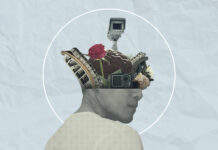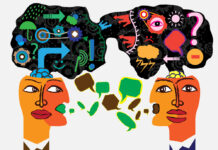A recent paper applies concepts from the philosophy of phenomenology to reconceptualize how we understand psychopathology and psychotherapy. Rather than an individualistic understanding based in the brain, or even the traditional notion of an “inner psyche,” the author suggests that the mind, and by extension psychopathology, is based in the experienced body and its ecological activities. This reconceptualization can assist in understanding psychotherapy differently, with greater attention paid to the person’s lived experience, their embeddedness in the world, and the therapy relationship itself.
“Based on the phenomenology of the body and ecological psychology, this paper introduces a series of concepts that enable us to overcome the still prevailing idea of an inner psyche and a corresponding individualistic view of psychopathology. These concepts are the phenomenal field, lived space, intercorporeality, and body memory; they correspond to an embodied, enactive, and ecological view of the mind. On their basis, psychiatric illnesses may be conceived as relational disorders resulting in various restrictions, and impairments of the patient’s lived space,” psychiatrist Thomas Fuchs of Heidelberg University in Germany writes in Psychopathology.
“The main tasks of psychotherapy, then, are to use the interactive phenomenal field as a means of restructuring the patient’s relational patterns and to support his or her capacity to engage in more beneficial interactions with others.”

Psychology has a long history of treating individuals out of context. This focus on the individual is in many ways the crux of the medical model, which many believe seeks individual solutions to social and economic problems. Some have called for a context-based or decolonial approach to mental health, situating the person in socio-historical and economic contexts, rather than looking exclusively at the brain or mind.
The philosophical school of phenomenology has been a steady contributor to these alternative perspectives, arguing for instance, that psychology should focus on the lived body rather than the body as a physical object. In addition, phenomenologists have argued against the idea of an isolated, separate self, instead of focusing on the self as intimately connected to a set of ecological environments.
“The very notion of the ‘psyche,’ like all terms derived from it, implies the idea of a disembodied and nonspatial inner world, be it conscious or unconscious, which is located inside of the individual, usually in the brain,” explains Dr. Fuchs.
“Regardless of whether we presuppose the drives, introjects, or inner objects of psychoanalysis, whether we believe in the memory storages, ’theory of mind’ or ‘self-modules’ of cognitive science, or whether we take the brain centers and nuclei of a phrenological neurobiology to be the real substrate of the psyche – in any case the dominant scientific paradigms are still characterized by the fundamental separation of the subject from the living body, from his or her relations to the environment and from his or her connections to others in the shared life-world.”
The current paper introduces several concepts from phenomenology to help clinicians understand their clients in a more humanizing and context-sensitive way. Many psychologists take for granted a particular perspective on the self, psychopathology, and the therapy relationship, based in unacknowledged conceptual baggage from western history and social life. These perspectives encourage certain kinds of treatment over others, and they often lack insight into how psychopathology is experienced, how ecological contexts affect people, and how therapy may provide relief from experiences of suffering.
The first concepts introduced are the phenomenal field and body memory. The phenomenal field is essentially the entire field of a person’s experience, including background feelings, social interactions, bodily relations with the environment, as well as a person’s history and future. All of this combines to form a field of experience that cannot be located exclusively inside of an individual. The phenomenal field exists between a person’s mind-body system and their set of environments. Body memory is closely tied to the notion of a phenomenal field, emphasizing how our lived experience of the world is linked to past and present bodily experiences and capacities for action. Body memory is enabled, in part, by what Fuchs calls “intercorporeal memory,” meaning how our interactions with others affect what our bodies understand in the present as possible, healthy, or good.
“The body is thus the ensemble of acquired predispositions and capacities to perceive, to act, but also to desire and to communicate. Anchored in body memory, these capacities extend over the environment like an invisible network, which relates us to things and other people. The body is our permanent means to actualize our past and, with this, to make ourselves feel at home in situations. Importantly, what is mediated and enabled by body memory is mostly forgotten in terms of explicit memory; it becomes ‘unconscious.’ An everyday example may be seen in the capacity of typewriting, which is a memory ‘in the fingers’ that is unavailable for explicit knowledge.”
The next concept discussed is life space. A life space, or lived space, is the totality of all situations that a person inhabits. These situations not only affect how a person experiences the world but also create the conditions for what a person experiences as possible or desirable. The life space can be understood as having its own kind of “physics,” based in attraction and repulsion, gravitation, and more. An infant’s attachment to its mother is used as an example—in this case, the infant’s life space revolves around and is supported by the mother. Safety and a sense of home are found within the “orbit” of the mother’s body. The further the infant moves away from the mother, the more its own lived space will feel lonely or empty.
These concepts are then applied to psychopathology and psychotherapy. Many forms of psychopathology can be understood through this lens. Depression, for example, is a kind of bodily constriction that also constricts a person’s experienced set of possibilities and emotions. Emotional traumas may be considered a “zone of avoidance” within the life space, which can hinder the person’s potential to engage with life and find fulfillment with others. All of this is based in the person’s intercorporeal memory—or history of life experiences with others—rather than arising out of a reductionistic “brain disorder.”
“Depression thus becomes a disorder of intercorporeality and interaffectivity, resulting in a more or less severe restriction of the life space. Generally, symptoms of a psychic disorder may directly manifest an alteration of embodiment, such as the bodily constriction (“hyperembodiment”) in depression, or the “disembodiment” and loss of attunement in schizophrenia. Other symptoms may instead be considered secondary reactions of the patient, to maintain at least a reduced control, such as self-harm, eating disorders, and hypochondriac or compulsory behavior.”
Dr. Fuchs argues that these concepts can provide a reorientation of how psychotherapy is understood and practiced. Rather than focusing on changing the “inside” of the person, the “interactive phenomenal field” is the locus of change. Therapists can assist clients in opening new possibilities for action and experience within the phenomenal field.
There is an “interpersonal atmosphere” that exists between therapist and client. Increasing sensitivity to this field, including an awareness of the client as well as therapist “attractors” and “avoidances,” can help shift the client’s life space to contain a greater degree of freedom. This requires the therapist to be aware of his or her own intercorporeal memory and life space, so as not to fall into pathological patterns.
“Hence, from a phenomenological viewpoint, the process of psychotherapy is experiential and embodied rather than cognitive, insight-oriented, or ‘archaeological.’ The patient’s habitual or implicit ways of relating to others are reenacted in the ‘here and now’ of the therapeutic relationship and may be changed through new experiences,” Fuchs concludes.
“In such a view, it is not so much the explicit past that is in the focus of the therapeutic process but rather the implicit past which organizes and structures the patient’s phenomenal field of relating to others. As we have seen, however, it is frequently not a concordant but rather precisely a non-expected behavior of the therapist which allows the patient to make a corrective relational experience and to break out of ingrained behavior patterns.”
****
Fuchs, T. (2019). The interactive phenomenal field and the life space: A sketch of an ecological concept of psychotherapy. Psychopathology, 63-70. (Link)















Says much to begin and look at psychosis through a trauma lens.
Report comment
ECT’s destruction of memories, connections, history, recollections of trauma means a end to recovery, to using this approach.
It is the biggest trauma the brain can experience.
Report comment
I was eager this article, given the term “ecological”, as I’m currently writing about nature and mind. But I couldn’t get past page one. I can see this fella has plenty of good stuff to say, but it’s written in such abstract terms, clearly without a common reader in mind. Why do the knowledge-makers of today feel a need to invent so many new terms, usually with as many syllables as they can muster without looking silly? Why would someone philosophize about the nature of mind in a way that can’t be easily comprehended by most people, who also have minds and may want to weigh in? It feels superior, and distancing. Oppressive, actually, which is not a word I use casually. I can’t for the life of me figure why academic articles are stylistically inaccessible when most academies have an explicit mission of social justice and consciousness-raising. Don’t they want to reach common people, meaning folks who don’t spend their free time pondering deconstructionism and post-modernism and all that? I wish more paid thinkers would spend their time valuing and contributing to common sense instead of writing for their own kind.
Report comment
Hi Steven,
For some “language” is of utmost importance.
Many disciplines have now made it about words, and is often about outdebating each other.
What happens in debates is the one less able to use words like swords might look like the loser, PURELY, by lack of words.
Some of us need to go back to school to simply deal with people who armed themselves with language.
Language often makes people sound as if they carry, or it carries weight. Psychiatry made up a language to suit diagnosis. Lawyers have their own.
I have fallen asleep from language. There are some highly educated people that rarely use words or concepts that people can’t understand.
I think it is a skill.
I love articles that I can read through with ease.
Report comment